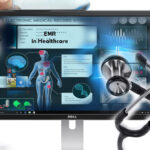Trends expected to accelerate for healthcare should work towards the betterment to meet the health demands of patients. The Healthcare industry is undergoing innovations, technological advancements and Artificial intelligence is becoming a part of the healthcare ecosystem widely.

With the increase in demand for healthcare especially post Covid, the healthcare industry is working toward betterment to meet the health demands of patients. Health for all is a must. As well as the person should be physically, mentally, emotionally strong enough to live a healthy life. Healthcare should be easily accessible and approachable to everyone.
Health challenges such as poor mental health, substance abuse in the form of drugs and alcohol need attention. When healthcare is not accessible to all, poor health outcomes are observed. The Healthcare industry is undergoing innovations, technological advancements, and establishing new trends to accelerate healthcare. Artificial intelligence is emerging in healthcare and is widely used in western countries and in India too.
AI works very efficiently, quickly and completes the process at a lower cost, and even saves time. AI is becoming a part of the healthcare ecosystem widely. Technological advancements include numerous applications that help in encouraging a healthy lifestyle among humans these days. Wearable devices with AI are helpful to diagnose early-stage heart disease. This provides quick treatment on time and better monitoring by doctors and caregivers.
Trends expected to accelerate for healthcare
Artificial Intelligence
Artificial Intelligence is doing tasks quickly these days. It saves time and is cost-effective too. How Artificial intelligence is accelerating healthcare?
1. Better Medical care by prompt and accurate diagnosis
It provides doctors with an accurate diagnosis. It also provides the present history and history of associated medical conditions. It also identifies the future complications that a patient could face.
2. Improved line of treatment
Technological advancements have generated an improved line of treatment plans like robotic surgeries. As well accurate diagnosis help in providing a better treatment plan.
3. Continuous self-monitoring by patients
Continuous self-monitoring by patients itself provides early diagnosis, prompt treatment for patients thus preventing emergencies. This is helpful in overall best patient outcomes thus the good quality of life.
4. Technologically advanced radiology
CT scans, MRI scans, and other radiological advancements are already playing an important role in the healthcare system. Research is going to develop Artificial intelligence-based radiological advancement. This will help in eliminating the biopsies required in most advanced cases like cancers for diagnosis or planning the treatment.
5. Easily accessible
With AI the advanced digital healthcare system is accessible to a large number of people nowadays. Improved and easy accessibility is helping a large of people to get efficient healthcare guidance and treatment on time.
6. Affordable and cheap
AI has made the healthcare system affordable with an accurate and quick diagnosis. The treatment is thus becoming more efficient and accessible to many.
7. Technologically advanced Robotic Surgeries
Robotic surgery techniques in complex surgeries provide accuracy, precision, very few side effects, early discharge from the hospital, and fast recovery.
8. Time-saving
Artificial intelligence is processing the healthcare system at a faster speed. Manual work used to consume a lot of time and energy. Shifting to digital healthcare helps provide better health to people in less time.
9. Advanced treatment for cancer
Artificial intelligence in Immunotherapy is used to treat a cancer patient. Through immunotherapy, the body’s immunity helps in fighting and killing cancer cells. This is the advanced technique used to treat cancer patients these days widely.
Hospital administration
Artificial intelligence use in hospital and healthcare clinics and settings is a boom in the healthcare industry. It could be used to manage medical records, documentation, data entry, billing. This saves time and reduces the manual work burden on the employers.
Health guidance and treatment virtually
AI helps patients to self-monitor themselves up to some extent. The wearable devices are helpful and assist in self-monitoring. These devices also remind about when to take the medicine, if any medication is missed, lab tests reminder, scheduled doctors appointment for a consultation or follow up, and even assist in Virtual appointments with the Doctor whenever required.
Virtual Health assistance and guidance through various applications available handy through mobile phones help patients to discuss their health problems, symptoms, medical history, insurance details, health-related queries, diet-related queries thus increasing patient engagement.
Various applications provide 24/7 assistance to patients by responding to voice calls, video calls, and text messages through mobile devices thus improving patient engagement and health wellness. Virtual health support is affordable and even save traveling time and waiting time at hospitals by consulting doctor virtually.
Mobile applications and healthcare
With Artificial Intelligence patients are engaged these days through mobile applications that are free of cost. They keep well informed about how to manage lifestyle diseases like Diabetes, heart diseases, high cholesterol. These apps are helpful in scheduling doctor’s appointments, prescription management, and updating health-related queries. These apps also suggest prompt medical advice and treatment during emergencies.
Telemedicine
Telemedicine is gaining popularity worldwide. Through telemedicine, the healthcare services like consultations, health-related information, treatment, queries about how to maintain lifestyle disorders are provided to the patient through electronic media. Telemedicine has helped in the delivery of health-related information without a patient’s visit in-person to a clinic or hospital. The physician and patient could have interaction through telemedicine and could discuss the health-related queries, care, advice required for patient care and monitoring.
Through Telemedicine health care professionals could diagnose, prevent, evaluate the disease and provide treatment to the patient without the in-person visit of the patient to the clinic or hospital. In underdeveloped or low-income countries, Telemedicine helps provide clinical information and learn to healthcare providers, physicians, and tertiary hospitals regarding healthcare through video and audio conferencing.
Telemedicine and its advantage
Telemedicine is efficient and low-cost treatment approaches helpful both in emergency and non-emergency conditions. One can take medical assistance simply by talking over call to a physician for simple health issues. The investigations are shared via electronic media with a physician without visiting them at a clinic or hospital.
Follow-up visits for chronic health issues like diabetes, blood pressure are monitored over the call or video conferencing or simply through text messages. It is a cost-effective approach and saves time both at the same time. It cut the traveling expenses, reduces long waiting hours at the hospital, and provides prompt treatment guidance.
How Telemedicine works
Telemedicine provides consultations at ease for chronic health issues such as diabetes, blood pressure, cholesterol, and non-emergency conditions. The information is stored easily in software. It reduces paperwork and manual work for physicians and staff. All the information is stored as data in the software and the doctor gains accessibility whenever required.
The information like lab reports, diagnostic imaging like x rays, blood investigations are shared by the patient to the physician and by a physician to another healthcare provider for appropriate assessment within no time. The follow-up visits for patients are reduced by managing them through telemedicine. The patients could take a second opinion from another doctor without visiting. This prevents traveling and long hours of waiting time. Health applications, websites are accessible on smartphones and consultation could be taken from healthcare providers within no time.
Wearable devices in healthcare
Wearable devices available these days in the form of advanced technological advancement is famous worldwide. These devices are helpful in day to day monitoring of patients on regular basis. The wearable devices are available as smart watches that are worn on the wrist for tracking health information. These devices and the apps provide guidance about lifestyle disorders, how to manage them and how to prevent them.
It is affordable and personal and can be taken at every place the patient visits even to the bathrooms. The wearable devices detect heart rate, blood pressure, transfer data to the doctor, and also give signals during the alarming situation. The smart watch can prompt you to do exercise, sleep, take a rest, and have endless other functions. Wearable devices in the form of fitness trackers monitor the heart rate at rest and during physical activity. Wearable blood pressure measuring devices are very useful, in calculating the blood pressure
Conclusion
New innovative trends are emerging and accelerating in healthcare. New technology is finding its way to improve healthcare by increasing its access to more and more people at affordable cost.


Dr Jyotsana Anand Suri
Certified medical content writer
Email: jyotsana789@gmail.com











